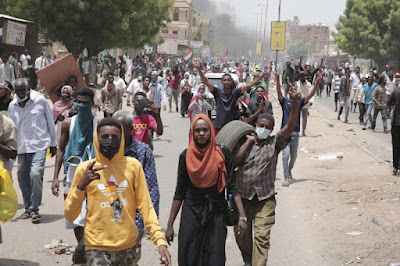Sudan Doctors: 8 People Killed in Mass Rallies Against Coup
By NOHA ELHENNAWY
Sudanese anti-military protesters march in demonstrations in the capital of Sudan, Khartoum, on Thursday, June 30, 2022. A Sudanese medical group says multiple people were killed on Thursday in the anti-coup rallies during which security forces fired on protesters denouncing the country’s military rulers and demanding an immediate transfer of power to civilians. (AP Photo/Marwan Ali)
CAIRO (AP) — Sudanese security forces shot eight people to death during anti-coup protests Thursday, a medical group said as thousands marched to denounce the country’s military rulers and demand an immediate transfer of power to civilians.
The Sudan’s Doctors Committee said in a tweet that six people were fatally shot when police fired live ammunition at protesters in Omdurman, the twin city of Khartoum, the Sudanese capital.
Across the Nile River in Khartoum, another person died from a gunshot wound in the head and a child died after being shot in the chest, according the group, which tracks casualties during protests. The identities of the eight were not immediately known.
Also in Khartoum, police fired tear gas at thousands of demonstrators trying to reach the Republican Palace, the military’s seat of power in the heart of the city. Videos showing thousands waving Sudanese flags and running under clouds of tear gas were posted on social media.
Other videos show demonstrators raising banners reading “No Negotiations! No Partnership” — reiterating their opposition to any power-sharing deal with the military rulers.
Sudan’s leading pro-democracy groups — Forces for the Declaration of Freedom and Change and the Resistance Committees — had called for nationwide protest Thursday to reiterate their demands for a reversal of the Oct. 25 military coup. The takeover upended the East African country’s short-lived transition to democracy following the 2019 ouster of longtime autocratic ruler Omar al-Bashir.
Thursday’s protests also fell on the third anniversary of a 2019 mass rally that forced the generals to sit down at the negotiating table with pro-democracy groups and eventually sign a power-sharing agreement that was expected to govern Sudan during a transitional period, until general elections were to be held. The coup last October scuttled this arrangement.
“We’re very, very much gravely concerned by the continued use of excessive force by the government security forces in Sudan as they respond to protests and especially what we’ve seen today,” U.N. spokesman Stephane Dujarric said in New York. “It is imperative that people be allowed to express themselves freely and peacefully, and security forces in any country should be there to protect people’s right to do that, not to hinder it.”
Meanwhile, the London-based internet advocacy group, NetBlocks, said internet access was disrupted across many mobile and fixed-line internet providers in Sudan on Thursday, including state operator Sudantel, leaving national connectivity at only 17% of its ordinary level. Cuts to internet services have been routinely recorded ahead of most anti-coup protests.
“NetBlocks recommends against the use of network disruptions and social media restrictions to counter protests, given their disproportionate impact to fundamental rights including freedom of expression and freedom of assembly,” said the London-based group.
The October coup triggered near-weekly street demonstrations, which authorities have met with a deadly crackdown that has so far killed 111 people, including Thursday’s casualties. Among those killed were 18 children, according to the Doctors Committee.
Hundreds of people, including prominent politicians and activists, have been detained, although many have been released recently as part of trust-building measures.
Since the coup, the U.N. political mission in Sudan, the African Union, and the eight-nation east African regional Intergovernmental Authority in Development group have been trying to broker a way out of the political impasse. Earlier this month, the leading pro-democracy group finally agreed to sit with the generals in a meeting that was brokered by the United States and Saudi Arabia.
However, no breakthrough has materialized from these talks.




















